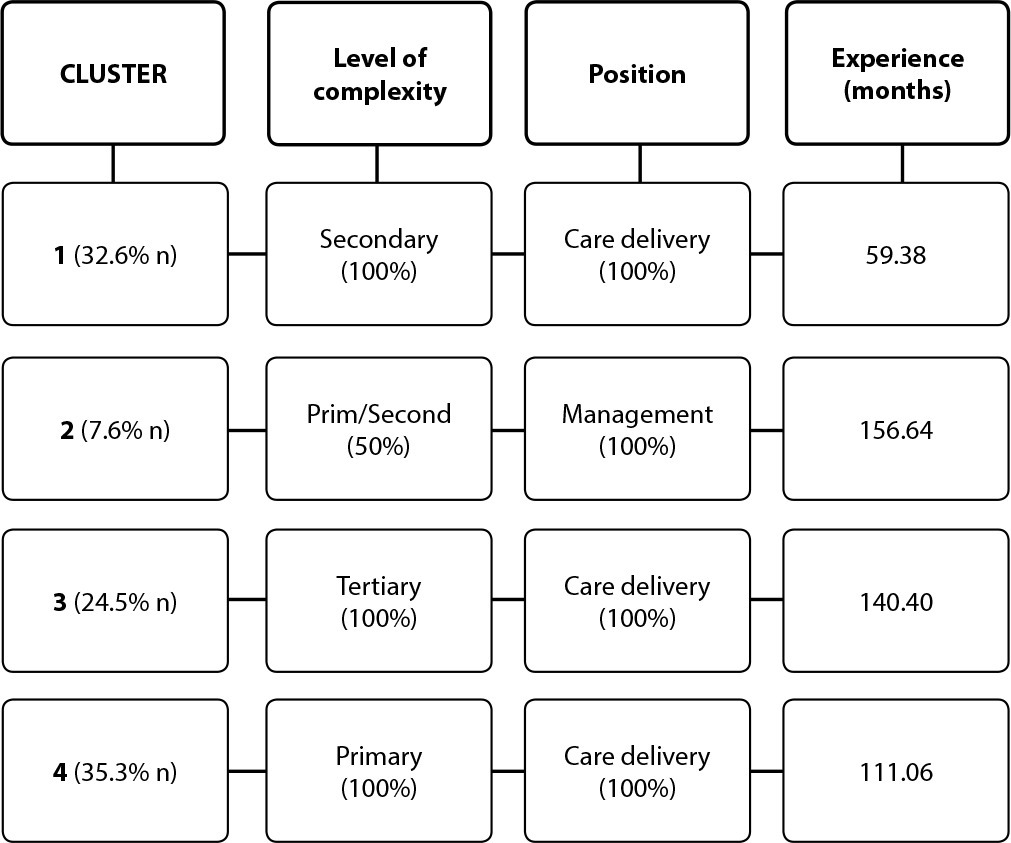-
ORIGINAL ARTICLE
Clustering the engagement of Brazilian nurses in political advocacy
Revista Brasileira de Enfermagem. 2022;75(1):e20210105
09-19-2022
Resumo
ORIGINAL ARTICLEClustering the engagement of Brazilian nurses in political advocacy
Revista Brasileira de Enfermagem. 2022;75(1):e20210105
09-19-2022DOI 10.1590/0034-7167-2021-0105
Visualizações0Ver maisABSTRACT
Objectives:
to analyze the level of nurses’ engagement in political advocacy by performing cluster analysis.
Methods:
observational study, with a quantitative approach. A total of 184 nurses working in primary, secondary, and tertiary care in a city in the south of Brazil completed the Policy Advocacy Engagement Scale. Data analysis consisted of descriptive statistics, cluster analysis, analysis of variance, and chi. The Institutional Review Board approved the study.
Results:
four differentiated clusters were found according to professional experience, level of healthcare complexity, and unit. The cluster analysis revealed that patient advocacy for community-based obtained the highest mean, indicating that political advocacy is effective in organizational environments and that professional qualification favors greater engagement in political advocacy.
Conclusions:
the results reveal that nurses play an active role in political advocacy, seeking to promote positive changes in health, especially those working in tertiary care, the nurse group that obtained the highest means.

-
ORIGINAL ARTICLE
Preceptorship in nursing-midwifery: a training-intervention in health work
Revista Brasileira de Enfermagem. 2020;73(suppl 6):e20190661
12-21-2020
Resumo
ORIGINAL ARTICLEPreceptorship in nursing-midwifery: a training-intervention in health work
Revista Brasileira de Enfermagem. 2020;73(suppl 6):e20190661
12-21-2020DOI 10.1590/0034-7167-2019-0661
Visualizações0ABSTRACT
Objectives:
to analyze how certified nurse-midwives identify preceptorship in a nursing-midwifery enhancing course conducted by the Universidade Federal Fluminense as a possibility of training to promote institutional support and intervention.
Methods:
a descriptive, exploratory research with qualitative approach. Six certified nurse-midwife preceptors from the Nursing-Midwifery Enhancing Course participated in the study in 2019. Two public maternity hospitals in Rio de Janeiro were settings of the research. Individual interview and thematic content analysis were used to collect and analyze data.
Results:
exchange of knowledge between preceptors and trainees encouraged learning and reflection stemming from delivery and birth, contributing to expansion of autonomy and professional leading role in training, health care, and management.
Final Considerations:
collective meetings that promote work analysis and value the performance of certified nurse-midwives have led to intervention processes and institutional support in maternity hospitals in Rio de Janeiro, Brazil.
Palavras-chave: Health AdministrationHumanization of AssistanceObstetric NursingProfessional TrainingWork EngagementVer mais -
ORIGINAL ARTICLE
Occupational stress and engagement in primary health care workers
Revista Brasileira de Enfermagem. 2019;72(6):1580-1587
10-21-2019
Resumo
ORIGINAL ARTICLEOccupational stress and engagement in primary health care workers
Revista Brasileira de Enfermagem. 2019;72(6):1580-1587
10-21-2019DOI 10.1590/0034-7167-2018-0681
Visualizações0ABSTRACT
Objective:
To evaluate levels of occupational stress and work engagement among primary health care workers.
Method:
A descriptive, correlational and transversal study was carried out in a small municipality in the countryside of São Paulo, with a non-probabilistic sample of convenience, with 85 workers. Three self-applied instruments were used: one developed by researchers, containing sociodemographic variables; Work Stress Scale (WSS) and Utrech Work Engagement Scale (UWES).
Results:
Prevalence of women (72.6%), 40 years old or more (45.9%), 4 years and 4 months of mean working time in primary care. Thirty-one workers (36.5%) presented significant stress (scores ≥2.5). Work engagement showed a mean of 4.1 (±1.2) to 4.4 (±1.4), classified as high in all dimensions. Occupational stress and work engagement correlated negatively.
Conclusion:
Workers presented high levels of work engagement; more than one-third had significant occupational stress. Workers with high levels of occupational stress tend to have lower work engagement.
Palavras-chave: Family Health StrategyHealth PersonnelOccupational StressPrimary Health CareWork EngagementVer mais



